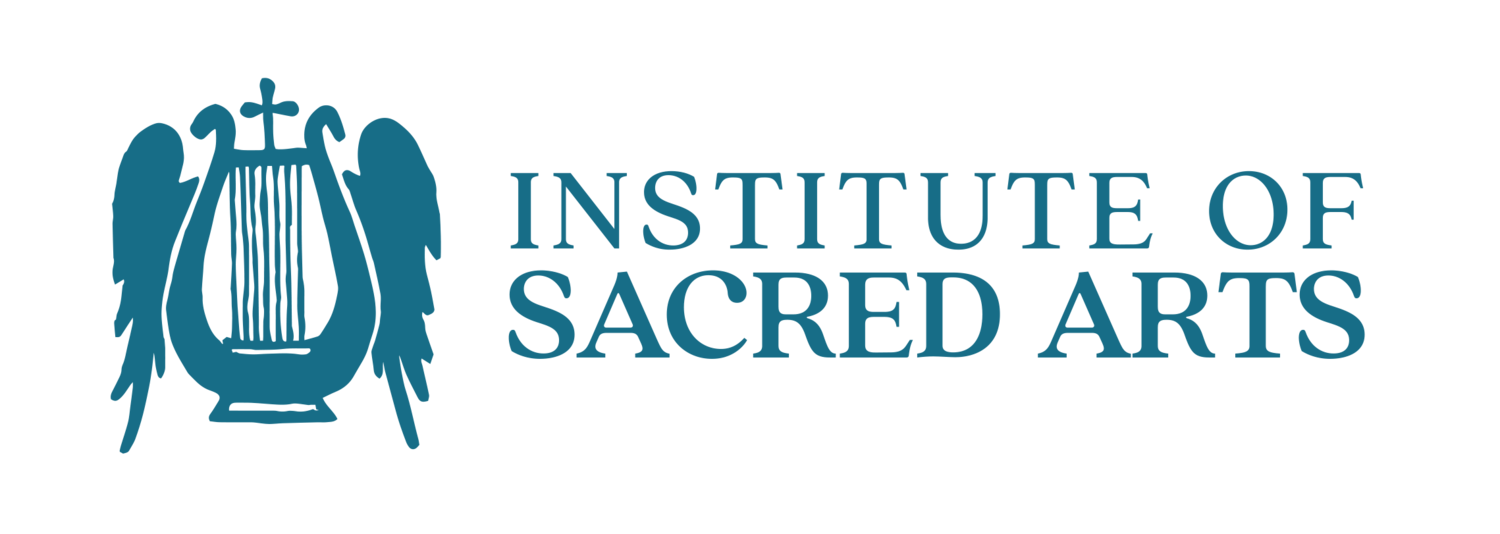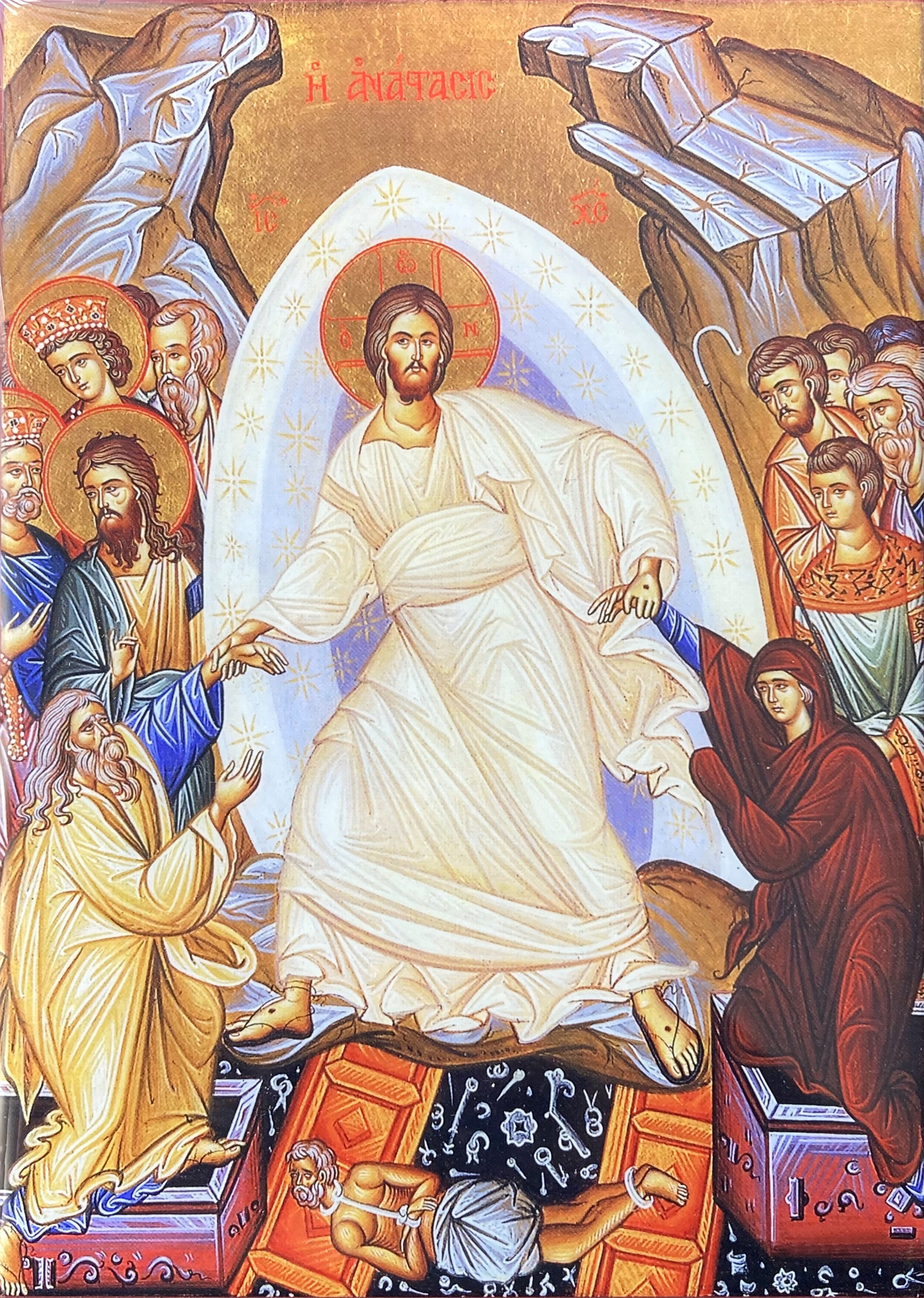John Capones: The Anastasis Icon — A Homily
For the Feast of Feasts: Just before the midnight service.
As we gather here this evening, I am perplexed by the paradox of light in darkness. Look around at our world and tell me: what is it that you see? The eyes of our hearts are confronted with passions, pains, and vices: saturating our world in a darkness even more prevailing than what dominates our temple at this moment. If we sit in such darkness, how then can we call upon God to illumine us, to show us light, in the perceived hopelessness of our present situation? I shall dare to be so bold, my brothers and sisters, and propose a simple answer: "look upon Him and [you shall be] enlightened [and your] faces shall not be ashamed." (Psalm 33: 5)
While Christ is undoubtedly here among us in this present hour, our spiritual eyes are not yet ready to see Him. As such, divine revelation and holy tradition have shown forth icons as worthy paradigms through which we might gaze into the heavenly realm and behold the effuge of our beloved Savior in His victorious, illustrious, and resurrectional glory.
In just a few moments, the celebrant shall emerge from the royal gates with light: beckoning us all forward to receive this light and expel the darkness from our midst. In doing so, let us not forget whose light it is that he brings to us and the events which so brilliantly shown forth to produce this light "which can never be overcome by night." (Paschal Troparion of Light)
Direct your eyes and hearts, my beloved, to the image of our Savior's resurrection placed here before us and you shall see the source of our light. Having descended into the realm of darkness, Christ is centrally placed within this image: a position in which I implore all of you to frame Him within your own hearts. As one beaten, humiliated, and dead, would we expect to see Christ now alive and clothed in white while saturating the darkness of Hades with the brightness of the mandorla behind Him? While it is perhaps our temptation to say no, I exhort you to embed these words upon your hearts: nature's order is conquered wherever the will of God is present. (First Kathisma of Christmas Orthros)
And so the author of Life willed to descend unto death so that He might raise up those who sat in darkness: equivocally willing to engage with the pain and suffering which our sinfulness continues to bring us here and now. Whether in illness or misfortune, perhaps we feel forgotten, forsaken, and betrayed; but were these not the feelings of Christ as He went voluntarily to the passion?
As the icon here before us so beautifully illustrates, Christ's descent below the earth shattered Hades’ bars and gates. The force with which the King of Glory entered this fearful place threw down its age-old gates and bound Hades in unbreakable chains. If we are faithful, my brothers and sisters, then this is the same force with which Christ will enter our present situation and re-establish the connection between Himself and us; but only if we are willing to receive Him.
While Christ's desire to save humanity trampled by the dominion of Hades, it simultaneously respects the free will with which He has endowed us as our Creator. To this end, Christ is ever close to us in our hour of need. He is ready to extend His helping hand if we are willing to extend ours as the primal parents, Adam and Eve, did while emerging from their tombs. However, this action is much more than a simple physical embrace. In actuality, it is an entrance into the new and eternal covenant of Christ in which we accept the expectations and responsibilities which this new call to communion commands.
We have fasted, been charitable, and attended the holy services. Have we not met our responsibility? Surely one has fasted, but has not abstained from idle talk or slander. One has been charitable to those less fortunate, but has been hardened in heart towards those of his own household. One has heard the holy services, but has not put into action within his own life the principles of the gospel which have fallen upon the deafness of his heart. Truly I say to you that until we have put off sin and pour forth the love of Christ in all that we do, these exercises are futile.
While perhaps a challenge at first, we are surely not the first to undertake this challenge. Once again turn your eyes and hearts to the icon of our Savior's resurrection and note the dynamic between Himself and our first parents whom he raises up from the grave today. Despite the fragility of age and sin they take courage; extending their hand and reaching for the wounded but victorious grasp of Christ's embrace. This is the connection for which God had been waiting since their fall from grace. In turn, this is the connection which Christ - the new Adam - hopes to make with us upon putting off our old ways and accepting our new life in Him.
Like Adam and Eve, we are not alone; we too can find strength in the examples of the Baptist and the Psalmist who flank Christ in the image now before us. Though he was God's anointed king, David's sinfulness was still "ever before him" (Psalm 50): but his repentance redeemed and restored him to communion with God. David's repentance is the same repentance which John preached by the rivers of the Jordan and continued to preach by the rocks of Hades; preparing even those who sat in darkness for the great light which shines forth today.
My brothers and sisters, let us be imitators of these men so that, in realizing our shortcomings, we may correct our ways and prepare for the Kingdom of God. While we cannot compose such poetry unto God as did David, let the words which flow from out of our mouths be few but richly sweetened in the joy of Christ's gospel. While we cannot bear the witness of John, let our everyday interactions with one another reflect a sober witness for the kingdom to come.
We will not always succeed. Surely, we shall stumble and fall. However, if we humble ourselves to continuously pick up and strive again – and like Adam and Eve in the icon to stretch out our hand - we may be assured of one thing: Christ will not abandon us. He has already humbled Himself in search of man. His knee is perpetually bent and hand outstretched. He simply waits for our hands to make even the slightest movement towards His; grasping our wrists to raise us up towards Himself and His heavenly embrace.
My beloved, the time has come. As you shall now extend your hands forward to receive this light, I implore you: extend the hands of your heart into the situations and people you shall encounter going forward. Extend the light which you shall receive here tonight and become witnesses to the power of Christ's salvific works. Extend your hands and encounter Christ, for He is ready: are you?

